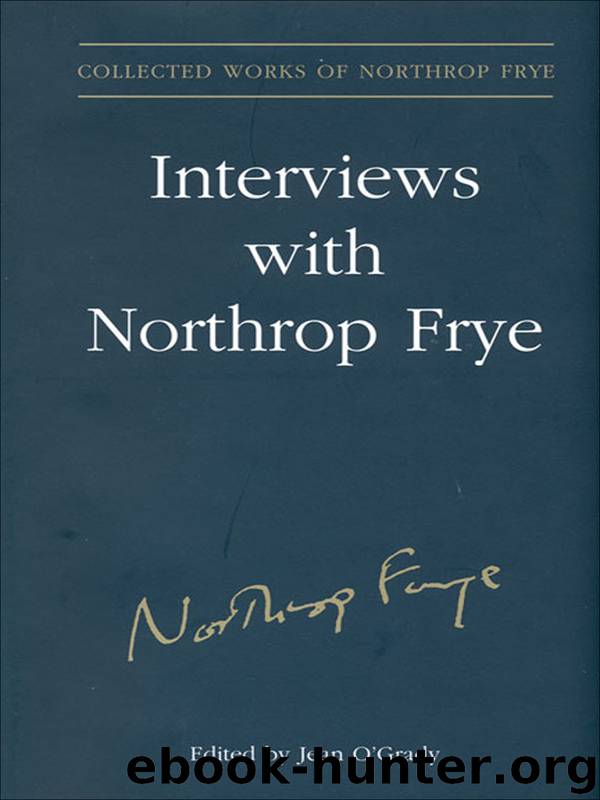Interviews with Northrop Frye by Frye Northrop.;O'Grady Jean;

Author:Frye, Northrop.;O'Grady, Jean;
Language: eng
Format: epub
Tags: LIT000000
Publisher: University of Toronto Press
Published: 2008-04-18T16:00:00+00:00
IV (10 August 1982, Part 2)
SCHATZKER: I’d like to talk a bit about the period from 1940 through to the end of the war, the period of the veteran students and the early ’50s. I suppose it ends in 1956, the date when the university decided that it had to expand because of the Plateau Committee, because of Professor Sheffield’s predictions about the large numbers of students that would be entering.37 Going back to this period, could you talk a bit about being a teacher at Victoria, the principals under whom you worked, the presidents if you had much contact with them, the atmosphere, the type of students that you encountered. I’m particularly interested in whatever work you had to do on college councils or university committees: the Faculty of Arts council, for instance, or the Senate. But if we could just go back and talk about what it was like being a teacher during this period.
FRYE: First of all, I was rumoured to be rather good with Honour students, so I got the Honour Courses to teach: partly too because my elders, Ned Pratt and John Robins, preferred the Pass Course. My colleague Joe Fisher had signed up almost the first day of the war. So I came back in the fall of 1939 to discover that in addition to three major Honour Courses which I was slated to teach I would also have to teach the Restoration and eighteenth-century course which he had. So I tackled that. I got fairly close to my students because I think the students’ instinct is always to go for the youngest member on the staff. I remember the students of those days quite well and they became close personal friends later. I realized that when the holding operation was over and the returned men had come back there was much more of a teaching challenge to meet, but I enjoyed those years immensely. I don’t know if I’ve remarked that in the first summer course with the returned people I had Judy LaMarsh and Doug Fisher and Keith Davey in the same class.38 In the period 1945–50 I was working pretty well within the department, going to council meetings, but not very faithfully, not connected with the senate; in general fairly preoccupied with teaching and my relation to the students. In those days being honorary president of the year was more than just a formality;39 and I was [faculty] advisor to Acta Victoriana, the student magazine, that kind of thing.
Then Pratt and Robins reached retiring age around 1952. After the war, Fisher had come back and Principal Brown thought that he would be the head of the department and that I would be left for writing and scholarship. But Joe died of cancer that year, in the summer of 1952, and I carried on as chairman of the department with what advice I could get from John Robins, who died in the Christmas of that year. So 1952 is not a date I’m likely to forget.
Download
This site does not store any files on its server. We only index and link to content provided by other sites. Please contact the content providers to delete copyright contents if any and email us, we'll remove relevant links or contents immediately.
| Books & Reading | Comparative Literature |
| Criticism & Theory | Genres & Styles |
| Movements & Periods | Reference |
| Regional & Cultural | Women Authors |
4 3 2 1: A Novel by Paul Auster(11768)
The handmaid's tale by Margaret Atwood(7429)
Giovanni's Room by James Baldwin(6789)
Asking the Right Questions: A Guide to Critical Thinking by M. Neil Browne & Stuart M. Keeley(5340)
Big Magic: Creative Living Beyond Fear by Elizabeth Gilbert(5332)
Ego Is the Enemy by Ryan Holiday(4927)
On Writing A Memoir of the Craft by Stephen King(4651)
The Body: A Guide for Occupants by Bill Bryson(4565)
Ken Follett - World without end by Ken Follett(4431)
Bluets by Maggie Nelson(4245)
Adulting by Kelly Williams Brown(4217)
Eat That Frog! by Brian Tracy(4141)
Guilty Pleasures by Laurell K Hamilton(4105)
White Noise - A Novel by Don DeLillo(3821)
The Poetry of Pablo Neruda by Pablo Neruda(3804)
Fingerprints of the Gods by Graham Hancock(3726)
Alive: The Story of the Andes Survivors by Piers Paul Read(3718)
The Book of Joy by Dalai Lama(3678)
The Bookshop by Penelope Fitzgerald(3610)
